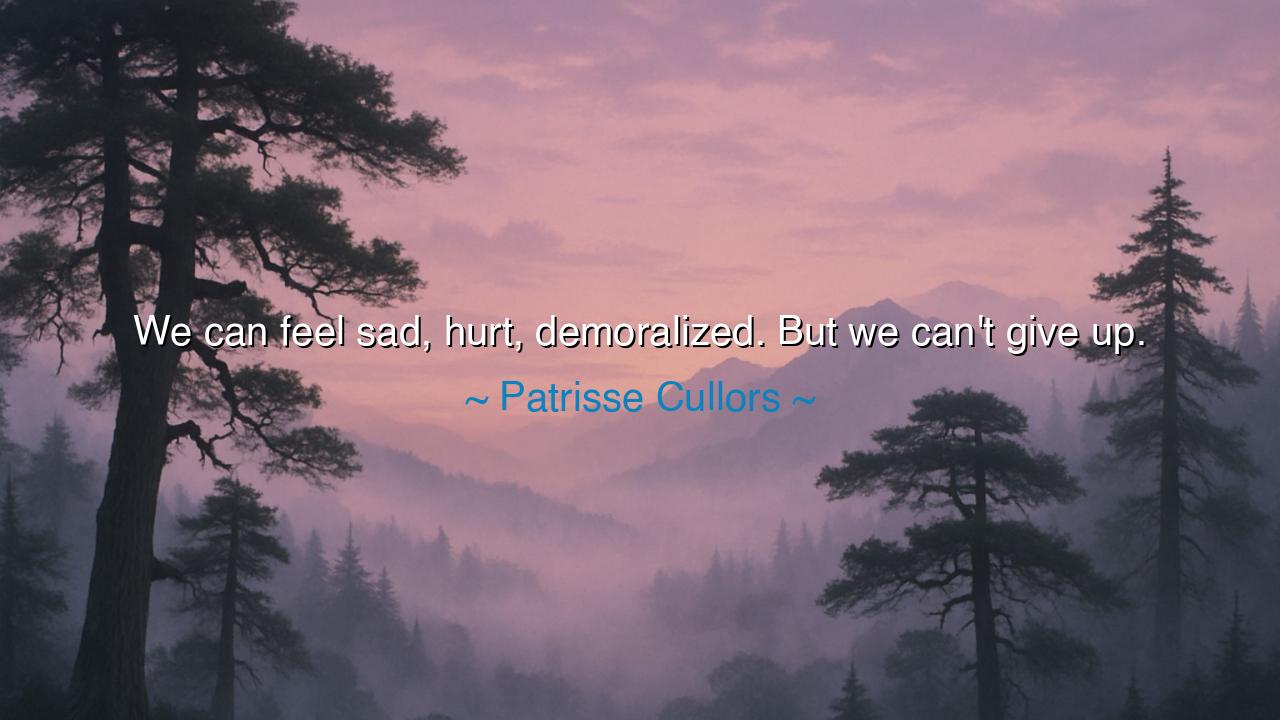
We can feel sad, hurt, demoralized. But we can't give up.






In the resolute and tender words of Patrisse Cullors, co-founder of the Black Lives Matter movement, there shines a flame that refuses to die: “We can feel sad, hurt, demoralized. But we can’t give up.” These words, though born from struggle, carry within them the seed of eternal endurance. They speak to the heart of every age, every people who have stood against despair and chosen to rise again. For what Cullors names here is not mere resilience — it is the sacred art of persistence, the divine stubbornness of the human spirit that continues even when the soul feels spent.
This quote emerges from a context of deep pain and resistance. Patrisse Cullors, an activist, artist, and visionary, uttered these words amid the relentless fight against racial injustice — a battle fraught with grief and exhaustion. She spoke not from the safety of triumph, but from the battlefield of sorrow. Yet her message transcends politics; it touches the ancient truth that all who seek justice, healing, or transformation must learn: that pain and perseverance must coexist. To feel deeply is not a weakness; it is the heartbeat of humanity. But to feel and still move forward — that is the mark of strength.
The ancients knew this truth. In the story of Prometheus, who defied the gods to bring fire to humankind, we see the same spirit. Bound to a rock, suffering endless torment, he did not regret his act of defiance. For Prometheus understood that to uplift others often means to bear wounds oneself. So too does Cullors remind us that the path of the righteous is not free of anguish. “We can feel sad,” she says — and we must. For sadness acknowledges love, loss, and longing. “We can feel hurt,” she continues — for hurt reveals that the heart is still alive, still capable of care. “We can feel demoralized” — for despair visits even the bravest. But in the final breath of her declaration, she calls forth the immortal command: “We can’t give up.”
This phrase, simple and direct, carries the weight of ages. Across history, countless souls have echoed this cry in their own tongues. When Harriet Tubman led enslaved people through perilous night after night toward freedom, she too must have felt sadness, hurt, and weariness. Yet she never turned back. “I freed a thousand slaves,” she once said, “and I could have freed a thousand more if only they knew they were slaves.” Her strength was not born of comfort but of conviction. Like Cullors, she knew that the moment of despair is also the moment that tests the soul — and that surrender would betray all those who still hoped.
To not give up is not to deny pain, but to walk through it with purpose. It is to understand that the universe itself has endured chaos, storms, and darkness before every dawn. The seed that breaks the soil feels resistance; the phoenix that rises must first burn. Cullors speaks for all who labor under the weight of injustice, yet she also speaks for anyone who has ever faced the silence of loss, the ache of failure, the loneliness of effort unacknowledged. Her wisdom is both a protest and a prayer — a reminder that persistence is the language of creation itself.
And yet, her words are not merely heroic; they are deeply human. By saying we can feel sadness and hurt, Cullors gives permission to be vulnerable, to rest, to acknowledge exhaustion. This is a crucial lesson, especially in times when the world demands endless endurance. To rest is not to give up. To cry is not to fail. The ancients called this balance fortitude — the courage not of the unfeeling, but of those who, though broken, remain whole. We are not meant to be made of stone, but of flesh — hearts that break and mend, over and over, in service of something greater.
Thus, the teaching of this quote is clear: Endure, but do not harden. Feel, but do not fall silent. Fight, but also heal. When despair whispers that your effort is in vain, remember that every act of perseverance adds to the slow turning of the world toward light. Even the smallest flame defies the night. Like Cullors, each of us must learn to carry our grief without surrendering to it — to honor our pain, but never to let it define our path.
So let this truth be passed down as a sacred inheritance: You will feel sad. You will feel hurt. You will feel demoralized. But you must not give up. For to endure is to honor all who came before, and to persevere is to clear the way for all who will come after. The heart that continues, even trembling, becomes the heartbeat of a better world. And in that heartbeat — steady, sorrowful, and strong — the soul of humanity endures forever.






AAdministratorAdministrator
Welcome, honored guests. Please leave a comment, we will respond soon